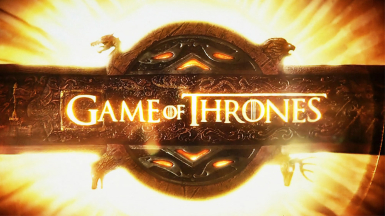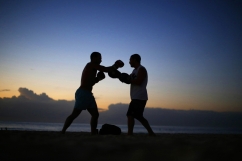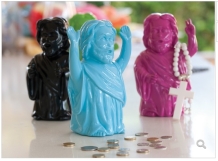
What is sin? What counts? If we were to make a list of the things that wrong or offend God, what would go on it?
Twenty years ago, when I was in a fairly middle of the road evangelical youth group, that list was pretty clear, and fairly lengthy. There's no single comprehensive list of sins in the Bible, but there's a famous list of commandments from which we can extrapolate some of the most universally agreed ones. Murder makes the list, obviously, as do theft, idol worship, adultery and coveting your neighbour's oxen. From there we'd look at the teachings of Jesus and then Paul, and add a bunch of Galatians 5 'sins of the flesh' - sexual immorality, debauchery, hatred, witchcraft, that sort of thing.
Before long the list was considerable, but it didn't stop there. There were more 'sins' - things that our youth leaders told us got in the way between people and God - which were perhaps less grave, but all of which were drawn from scripture. They were mostly of a social nature, ie generally concerned about our personal approach to holiness and therefore life.
I'd suggest that over the last couple of decades, that final list has been slowly eroded. For some reason, certain things that were almost universally agreed as 'sin' a few decades back, are either viewed much less seriously or even ignored. And since our lifestyle says much more about our theology than our words do, that erosion is arguably wider in practice even than we'd admit in theory. Here are some examples of what I mean...
1. A flutter on the National / Lottery
There was a time when gambling was viewed as one of society's most godless acts... today a quick scroll through Saturday-afternoon social media tells us that many Christians see no harm in the occasional bet on the horses or the football, or in spending a few loose coins on a lottery ticket or scratchcard. The latter practically counts as giving, right? The Bible doesn't specifically condemn gambling (although it says a fair amount about our attitude to money), so perhaps it's more a question of where we're placing our trust when we place that bet.
2. A bit of a swear
Rude words are no longer shocking in our culture - an in-context f-word won't take a film above a 12A certificate. In the church too, we've become more relaxed- most of us see swearing as an irrelevant character niggle at worst. In fact, many of the church leaders who we hold up as 'cool' enjoy a bit of a swear, even in their sermons, and some openly defend the fact. Paul talks about not allowing unwholesome talk to come out of our mouths - but maybe he didn't mean swearing anyway.
3. Game of Thrones
This is one of the clearest shifts. The average 90s Christian would have avoided 18 certificate films like he might have avoided Freddy Krueger from A Nightmare on Elm Street. Today, we positively brag about our engagement with zeitgeisty TV shows full of sex and violence. Of course, we have to understand the culture in order to speak prophetically into it - but some of us are taking that assignment REALLY seriously...
4. Sex before marriage
This is where it starts to get a bit more serious. Plenty has been made of how purity pledges ruin wedding nights - but on the flipside, whatever happened to the old perceived wisdom about 'keeping your feet on the floor' and 'not touching what you haven't got'? A friend recently told me of how she split with her boyfriend - a worship leader at a large London church, after he pressured her to sleep with him. His argument? 'Oh come on! Everyone's doing it!'
5. The inappropriate joke
Perhaps less important but far more prevalent - the nature of the humour shared between many Christians has gone downhill a long way since the days of Adrian Plass. Sometimes they're a bit rude (just decide what you think on point 2), but often they're also cruel or even prejudicial (with a healthy dose of postmodernism to make it all ok). The former is a question of how you navigate the grey areas, but the latter is a justice issue - arguably that's a bigger thing to be concerned about.
6. (Mac) Idolatry
One of the great Christian traditions is the discipline of simplicity - of having no other Gods, material or otherwise - that come between us and our creator. However, many of us now ascribe great worth to 'core brands' by which we can partly define ourselves. None is cooler - or more central to modern Christianity - than Apple, with their range of ever-upgrading desirable tech. You might be reading this on one of their devices; if so, join the club - I'm writing it on one. The question is - how easily could we give them up...?
7. The booze
Christian attitudes to alcohol have generally relaxed - again from a starting point that perhaps alienated us from our culture. But have they relaxed too far? Of course, one great argument for copious drinking is that Jesus brought out more - and better - wine after the guests were too inebriated to tell the difference between it and the cheap stuff. On the other hand, how in control are we of the impression we make on others after four Jägerbombs and a Bacardi Breezer?
8. Gluttony
We're living in a world where millions of children go to bed hungry - and hundreds of thousands of them are living not in some far-off distant land, but in the very country in which we live. Meanwhile, two of our biggest TV shows are The Great British Bake Off and Masterchef: The Professionals. Our culture turns food into something between an art form and an idol, and yet we can't distribute it in a way that enables everyone to have enough. Perhaps that's why the Bible talks so seriously about gluttony; perhaps it should also make us question why we can celebrate a portly pastor who loves bingeing on curry, while other sins would see him excommunicated.
9. Caffeine addiction
All addictions are bad - right? They're vices, which mean we're not in control of ourselves - therefore contravening various teachings on the importance of that. But wait - there's an exception! Coffee! It's ok, it makes us work harder! Right? Great. Caffeine is ok! It doesn't affect me at all! It's practically medicinal! PS: I didn't sleep last night.
10. Greed
Finally, the one that should perhaps convict us all. We all agree with our lips that greed is wrong - but our more or less total buy-in to a consumer culture - from the way we live our lives to the way we organise our churches - suggests something very different. It could be that our attitude to money ends up defining us a church generation.
Of course many would argue that many of these shifts represent positive and progressive steps for a church that was stuck in its Puritan past. Some would also point out that these 'sins' are still viewed in the way they always were in many churches - and so any generalisation of this sort will always miss the mark for some.
I do have a couple of nagging concerns. The first is that in a consumer culture, in which personal liberty has become an idol for some, it's easy to see how we could begin to take sin less seriously, and not for any great theologically justified reason. The Bible mentions that 'the wages of sin is death' - so if you take that at face value, it might be worth us thinking through what sin really means.
My other issue is about how today's young people - and others who perhaps don't follow the Christian faith - view this apparent shift in our collective behaviour. Do they sigh with relief that we're a little more chilled out these days, a little bit more like them than they imagined; perhaps a bit more accessible as a community they could join? I guess I hope that's true, but I fear it isn't. Rather, I wonder if they simply see us as a people who aren't that different, aren't that 'set apart', and who don't seem to care very much about the cause to which they claim devotion. Can we really expect them to want to join us? It's not exactly an inspiring call to a higher way of living.
To me the shift in our view of certain sins seems hard to deny. If that's due to a progressive journey of theology within the church, that's perhaps ok. If it's because we've sleepwalked there in the context of a progressive consumer culture, it should perhaps give us a little more cause for concern.
Martin Saunders is an author, screenwriter and the Deputy CEO of Youthscape. Follow him on Twitter @martinsaunders

















